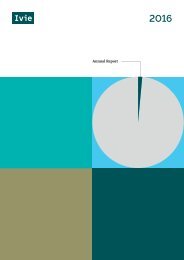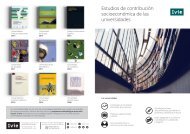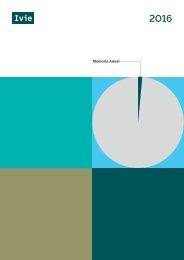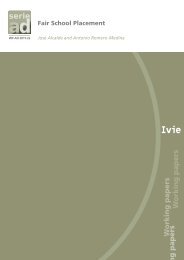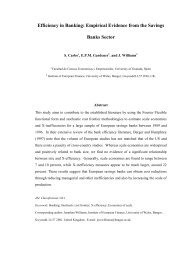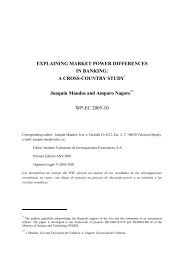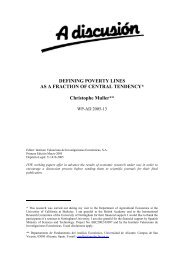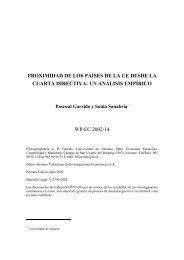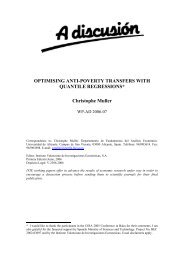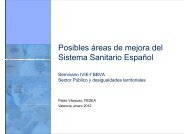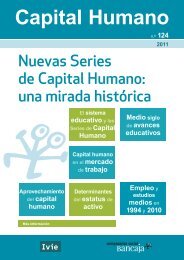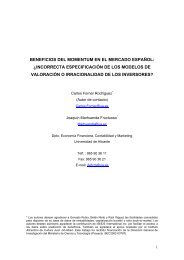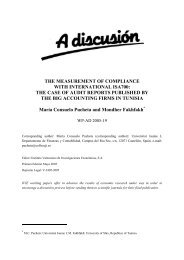Create successful ePaper yourself
Turn your PDF publications into a flip-book with our unique Google optimized e-Paper software.
Antonio Ariño (Universitat de València), Álvaro Berenguer (Universidad de Alicante), Gualberto Buela-Casal<br />
(Universidad de Granada), José Miguel Carot (Universitat Politècnica de Valencia), Fernando Casani<br />
(Universidad Autónoma de Madrid), M.ª Ángeles Fernández (Universitat Jaume I), Francisco J. Goerlich (<strong>Ivie</strong>,<br />
Universitat de València), José M.ª Gómez Sancho (Universidad de Zaragoza), Borja González (Universidad de<br />
Extremadura y Scimago Research Group), Juan Hernández Armenteros (Universidad de Jaén), Joan Oltra<br />
(Universitat de València), José Manuel Pastor (<strong>Ivie</strong>, Universitat de València), Carmen Pérez Esparells<br />
(Universidad Autónoma de Madrid), José Antonio Pérez (Universitat Politècnica de Valencia), Elías Sanz<br />
(Universidad Carlos III), Fernando Vidal (Universidad Miguel Hernández) and Antonio Villar (<strong>Ivie</strong>, Universidad<br />
Pablo de Olavide).<br />
The persistence of inequalities in the distribution of income and wealth, both worldwide and within countries, is<br />
one of the main economic and social problems and the subject of many policy measures. The purpose of the<br />
seminar EQUITY AND POVERTY, organized in collaboration with the BBVA Foundation and the Pablo de<br />
Olavide University of Seville, is to present the advances made on the measurement of inequality and poverty<br />
from a multidimensional perspective. Antonio Villar, professor at that University and <strong>Ivie</strong> senior researcher,<br />
coordinated this seminar in which a group of experts discussed how to define a poverty measure in a<br />
multidimensional context, i.e., how to choose appropriate poverty dimensions (beyond income or wealth),<br />
decide on their relative importance, fix sensible thresholds in those dimensions, set criteria to identify the poor<br />
individuals and define an overall measure of poverty intensity. The meeting was celebrated on 11 and 12 April<br />
in Seville and the following papers were presented:<br />
S. Alkire (OPHI-University of Oxford): "Multidimensional poverty indices"<br />
C. D’Ambrosio (Università di Milano-Bicocca): "The distribution of economic insecurity: Italy and the USA over<br />
the Great Recession"<br />
F.J. Goerlich (<strong>Ivie</strong>, Universitat de València): "Reinterpreting the inequality of the poor"<br />
C. Herrero (<strong>Ivie</strong>, Universidad de Alicante): "Multidimensional equity based evaluation"<br />
C. Laso de la Vega (Universidad del País Vasco): "The consistent measurement of the achievement and the<br />
shortfall inequality"<br />
J.D. Moreno (Universidad Pablo de Olavide): "A new axiomatic approach to the evaluation of population health"<br />
A. Villar (<strong>Ivie</strong>, Universidad Pablo de Olavide): "Welfare-poverty measurement"<br />
The conference EL AVANCE DE LA ECONOMÍA DEL CONOCIMIENTO EN ESPAÑA organized by VLC/CAMPUS<br />
in collaboration with the <strong>Ivie</strong>, was held on October 15 at the University-Enterprise Foundation of Valencia<br />
(ADEIT) in order to analyze the progress of knowledge economy in Spain and assess its impact. Also the<br />
ABACO project (Observatory of Knowledge-Based Activities) was presented, a joint idea of VLC/CAMPUS and<br />
the <strong>Ivie</strong> financed by the Spanish Ministry of Education, Culture and Sport which purpose is driving reflection,<br />
analyses and information on these activities.<br />
The opening speech was given by José Manuel Leceta (European Institute of Innovation and Technology) and<br />
was introduced by the rector of the Universitat de València, Esteban Morcillo. Next, Francisco Pérez and Javier<br />
Quesada (<strong>Ivie</strong>, Universitat de València) introduced the ABACO project in a session presented by the rector of<br />
the Polytechnic University of Valencia, Juan Juliá.<br />
In addition, during the conference, two panels of experts took place in order to discuss the following issues: "In<br />
what direction does knowledge economy advance in firms?", chaired by Juan Mulet (Cotec) and attended by<br />
Javier Igual (Ford España), Vicente Ruiz (RNB Cosméticos) and Salvador Mas (Openfinance); and "How do<br />
R&D centres contribute to knowledge based activities?", in which Daniel Ramón (Biópolis), Sebastián Subirats<br />
(Ainia) and Fernando Conesa (Universitat Politècnica de València) intervened and which was chaired by Cecilia<br />
Cabello (Fundación Española para la Ciencia y la Tecnología).<br />
64 Scientific meetings



